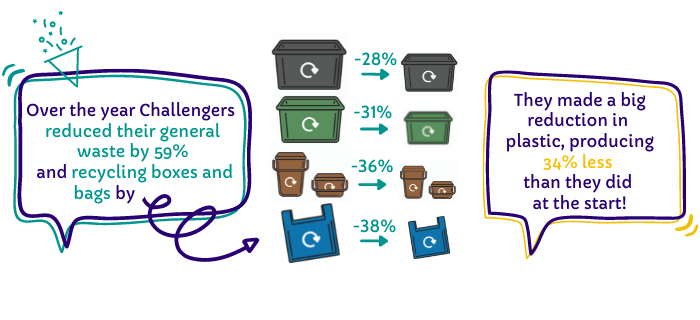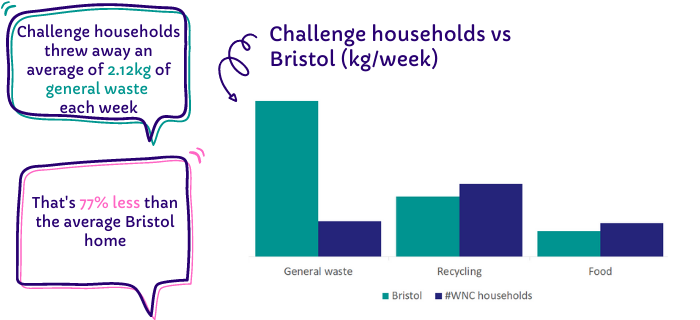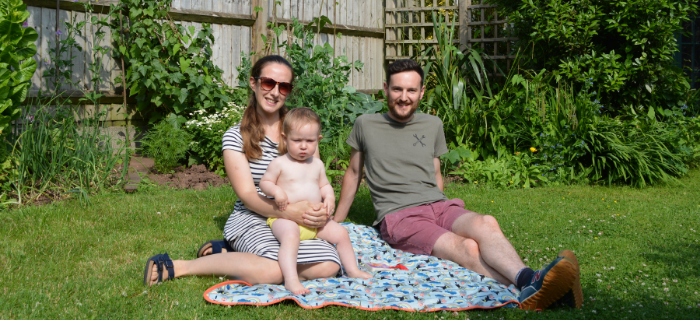#WasteNothing Challenge: results from year two

Challenge household's fantastic results
Just over a year ago, we challenged 100 households from across Bristol to see if they could dramatically reduce their waste over the course of 12 months. We worked with partners and mentors to provide guidance and support, and Challenge households kept a record of their progress throughout the year by weighing their waste and recycling every week.
Despite a difficult year with the pandemic, the results have been fantastic!

So, what are the figures?
Challenge households significantly reduced the amount of general waste and recycling they produced from the start to the end of the Challenge year. This shows a big change in habits and a move towards waste prevention. It is particularly impressive that Challenge households were able to reduce their general waste by 59% at a time when the average Bristol household’s general waste increased by around 20%.
Challenge households threw away a staggering 77% less waste than the average Bristol household, and got their average general waste down to just 2.12kg a week, that’s about the same as two bags of sugar! On average, Challenge Households also recycled 75% of what they put out for collection.

How did they do it?
Challenge households have undertaken a huge range of actions to try and reduce their waste:
Packaging was one of the biggest waste issues and Challenge households tried many actions to reduce it:
- Looking for packaging-free food and products
- Shopping at refill and zero waste shops
- Changing to returnable or packaging-free deliveries for things like milk, fruit and veg, and dry goods
- Replacing plastic bottles with solid bar versions of shampoo, conditioner, washing up liquid, deodorant and shaving foam
- Avoiding heavily packaged foods such as ready meals.
- Making more food from scratch such as bread, cakes, biscuits, hummus, pesto, and pastry.
What else did they try?
- Many households tried switching from disposables to reusable versions of things like nappies, razors, wet wipes and sanitary products.
- Most used a reusable kit including a water bottle, hot drinks cup, straws, shopping bags, and containers.
- Huge efforts were made to reduce food waste. Challenge households tried meal planning, batch cooking, using parts of the food that would normally get thrown away, and home composting.
- Lots of things that may normally have gone in the bin or for recycling were saved for reuse. Packaging was saved and passed on to others, and clothing was repaired or used for cleaning cloths.
- Challenge households also tried things like making their own beauty and cleaning products, shopping second-hand, growing some of their own food, and much more.
What did the Challengers say?
When asked what advice she would give to anyone else wanting to reduce their waste, Juliet said “Just choose one thing that’s going to be easy and achievable, and when you’ve got that into a good habit, then try another thing. Don’t try and do it all at once!”
Kate said “I feel really quite proud to live in a city where there are these kinds of initiatives, and people care that much about environmentalism and come together to do what they can.”
Tom, one of our Challengers who has young children, said: “The biggest change we made was the reusable nappies. We worked out we were using 70 disposable nappies a week, but we got that down most weeks to zero.”

What impact has the Waste Nothing Challenge had?
The Challenge has had a wide range of benefits. Slow and gradual change throughout the year has been shown to have a lasting impact on behaviour change.
96% of Challenge households said they expect to carry on their #WasteNothing actions beyond the end of the Challenge.
There has been a 200% increase in Challenge households “regularly” shopping in local independent and zero waste shops. 78% of Challenge households now “regularly” consciously purchase items without packaging.
What wider benefits have Challenge households experienced?
- Having a more general awareness or mindfulness of environmental issues
- Increased confidence through new skills
- Positive financial impacts through purchasing less and reduced impulse buying
- Being more careful with energy, water and car usage
- Being part of a collective rather than doing it by yourself
The ripple effect
One of the most important impacts of the Challenge is the ripple effect. As with the previous year, Challenge households reported talking to friends, family, neighbours and colleagues about their journey. Many also shared what they were doing through social media.
This helps to raise awareness about waste reduction with a much wider audience than just the 100 households directly involved. It also inspires others to try to reduce their own waste which has a much longer lasting impact.
A huge thank you from us!
Gwen Frost, Head of Innovation and Sustainability at Bristol Waste said:
Our fantastic Waste Nothing Challenge households have achieved an impressive amount of waste reduction over the course of a difficult year. Our aim is to be a zero waste city by 2050, and we have very ambitious targets to reach by 2025. If everyone in the city tried the actions of our Challengers who knows what we could achieve!
